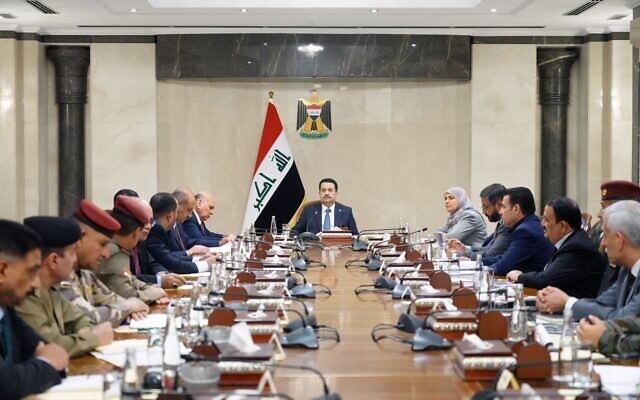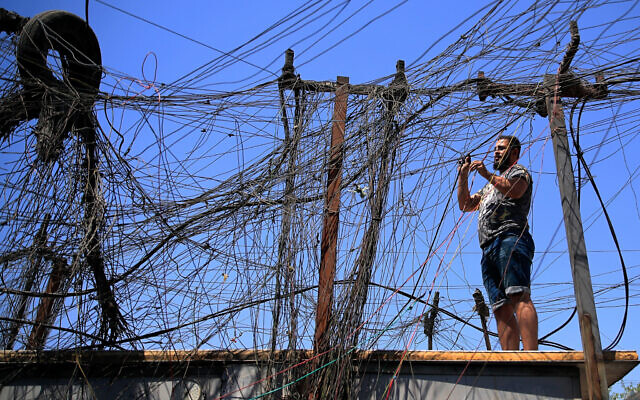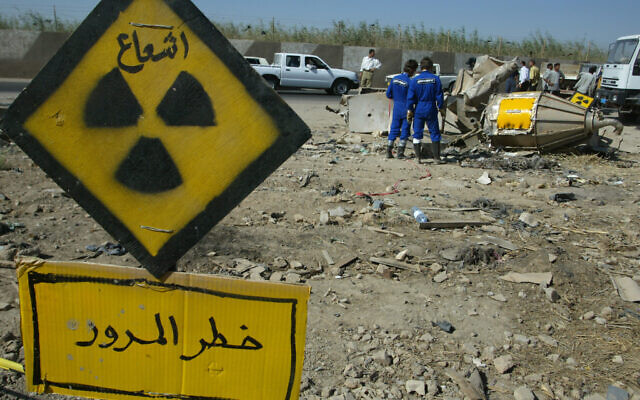Military spokesman confirms high-level meeting on developing peaceful program to diversify energy resources for oil-rich country
By TOI STAFF
Today,

Iraqi Prime Minister Mohammed Shia al-Sudani, center, leads a meeting in Baghdad on August 30, 2023, in a handout photo shared on the premier's X account. (Iraq Prime Minister's spokesperson)
Iraq’s government is pursuing a civilian nuclear program, the country’s military spokesman said, a potentially fraught development some four decades after a daring Israeli raid destroyed Baghdad’s reactor at Osirak.
Prime Minister Mohammed Shia al-Sudani discussed the development of a peaceful nuclear program during a meeting of the Ministerial Council for National Security on Wednesday, according to Maj. Gen. Yehia Rasool.
The reactor would be used to produce electricity, with the oil-rich state looking to reduce its dependence on polluting fossil fuels, Rasool said on X, the social media site formerly known as Twitter.
The sides discussed “initiating the building of a nuclear reactor limited to peaceful purposes,” he said.
The meeting was attended by other ministers, as well as a technical committee on nuclear energy, Rasool said.

Iraqi Prime Minister Mohammed Shia al-Sudani, center, leads a meeting in Baghdad on August 30, 2023, in a handout photo shared on the premier's X account. (Iraq Prime Minister's spokesperson)
Iraq’s government is pursuing a civilian nuclear program, the country’s military spokesman said, a potentially fraught development some four decades after a daring Israeli raid destroyed Baghdad’s reactor at Osirak.
Prime Minister Mohammed Shia al-Sudani discussed the development of a peaceful nuclear program during a meeting of the Ministerial Council for National Security on Wednesday, according to Maj. Gen. Yehia Rasool.
The reactor would be used to produce electricity, with the oil-rich state looking to reduce its dependence on polluting fossil fuels, Rasool said on X, the social media site formerly known as Twitter.
The sides discussed “initiating the building of a nuclear reactor limited to peaceful purposes,” he said.
The meeting was attended by other ministers, as well as a technical committee on nuclear energy, Rasool said.
Iraq has for years spoken about attempting to restart its nuclear program, but such discussions have rarely risen beyond low-level talks, stymied by endemic instability and vociferous Israeli and international opposition to such a move without intense oversight.
Electricity is a sensitive political issue in Iraq as despite the country’s huge oil reserves, its dilapidated power grid is incapable of meeting peak demand and Iraqis endure hours-long outages every summer.

Muqtada Haider turns the switches to transfer electricity to private homes in Baghdad, Iraq, Friday, Sept. 10, 2021. (AP/Hadi Mizban)
Ravaged by decades of conflict and international sanctions, the petrostate relies on Iranian gas imports for a third of its energy needs. It is also beset by rampant corruption.
To reduce its dependence on Iranian gas, Baghdad had been exploring several possibilities, including imports from Gulf countries such as Qatar, as well as recovering flared gas from oilfields.
In 1981, Israel partially destroyed an under-construction reactor at Osirak south of Baghdad, which was ostensibly being developed for peaceful purposes but was feared to be secretly intended to build an atomic weapon.
In 2003, American troops invaded the country on false intelligence that the country was hiding weapons of mass destruction, including alleged nuclear arms.
Israel is the only country in the Middle East with nuclear weapons, according to foreign reports, and the international community has expressed fears that a nuclear arms race could break out in the region should countries get the go-ahead to start enrichment.
Iranian attempts to enrich uranium, also claimed to be peaceful, have been met with punishing sanctions and threats of Israeli or US attack.
Saudi Arabia has recently stepped up pressure for an American okay for its own civilian nuclear program, reportedly dangling this as a prerequisite for normalization with Israel.
Israeli Defense Minister Yoav Gallant reportedly asked White House National Security Council Middle East coordinator Brett McGurk for clarifications regarding the putative Saudi program during their meeting in New York this week.
Earlier this month, Strategic Affairs Minister Ron Dermer said in an interview that Israel does not necessarily have a problem with a Saudi civilian nuclear program. Netanyahu’s office later issued a statement downplaying the remark, although a source close to the premier was quoted by Hebrew media reiterating that Israel “doesn’t rule out” the idea of Riyadh enriching uranium.

Greenpeace activists stand in front of a uranium oxide mixing vat outside the grounds of the Tuwaitha nuclear facility at Osirak, Iraq, June 24, 2003. (CRIS BOURONCLE / AFP)
“You have countries in the region that can have civilian nuclear power. That’s a different story than a nuclear weapons program,” Dermer said in an interview with PBS. Asked whether Israel would agree to Saudi Arabia having “civil nuclear capacity, including enrichment” in exchange for normalization, Dermer responded: “Like so many things, the devil is in the details, and we’re going to have to look at what ultimately is agreed upon.”
Iraq’s leader Sudani came to power last year via a coalition of Iranian-backed parties and is seen as close to Iran, although he has also attempted to build ties with the United States and Turkey.
Zman Yisrael writer Yaron Friedman and agencies contributed to this report.
No comments:
Post a Comment